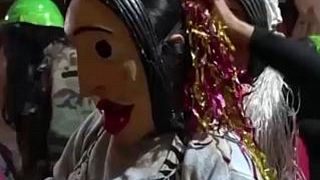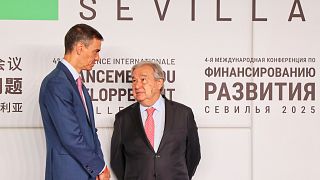Legislative election
Ivorian President Alassane Ouattara casts his vote in Abidjan for the parliamentary elections. His political opponent, former head of state Henri Konan Bédié voted an hour before him. More than seven million voters are being called upon to choose their deputies after a campaign without major incidents raised hopes for a return to a peaceful political climate, four months after a turbulent presidential election.
Grappling with a deep political crisis, President Alassane Ouattara has offered an olive branch to his former rival, Laurent Gbagbo, whose party has now lifted a decade-long boycott of elections.
More than 1,500 candidates are vying for the votes of roughly seven million people in a contest for the 255-seat National Assembly in the world's top cocoa grower, a former haven of peace and prosperity in troubled West Africa.
A masked Ouattara voted in the plush Cocody neighbourhood of Abidjan, Ivory Coast's main city and economic hub.
"I hope that the unfortunate events of the presidential elections of 2010 and 2020 are past us," he said, referring to poll-linked violence that claimed thousands of lives.
Micheline Irielou, a 43-year-old who lives in Abidjan's central Plateau district where all government offices are located, called for change.
"We're tired. We don't have much to eat. In my neighbourhood we don't have water and that's why I came to vote. So that it changes," she said.
In contrast to the bloodshed that marked the October 31 presidential poll, campaigning has been as peaceful as it has been enthusiastic.
All the candidates have pledged support for peaceful elections and signed up to a code of conduct.
"The prospect (of a high turnout) favours peaceful elections," said Adama Bictogo, a candidate for the constituency of Agboville, near Abidjan.
In the last legislative vote in December 2016, Ouattara's RHDP party teamed up with the centre-right Ivory Coast Democratic Party (PDCI), winning an absolute majority with 167 seats.
But last year's crisis has shattered that deal.
- New alliances -
In an unprecedented move, the PDCI has forged an election alliance with the centre-left coalition Together for Democracy and Solidarity (EDS), whose driving force is Gbagbo's Ivorian Popular Front (FPI).
Their declared aim is to prevent Ouattara and his party from "consolidating absolute power".
As a result, some commentators believe it could be the most open election in years, with the prospect that independents could hold the balance of power.
The October 31 presidential vote was marred by violence that claimed 87 lives and left hundreds of wounded.
Clashes had erupted over Ouattara's bid for a third term -- a plan that critics said sidestepped constitutional limits.
The 79-year-old was returned to power in a landslide thanks to an opposition boycott, but the country was mired in crisis.
Ouattara reached out to Gbagbo, whom he forced out in April 2011 after a post-election civil war that claimed several thousand lives and left the country deeply split.
After his ouster, Gbagbo, 75, was flown to the International Criminal Court in The Hague to face war crimes charges arising from that conflict.
He was acquitted in January 2019 and is now living in Brussels pending the outcome of an appeal.













00:57
Ivory Coast: African Union court deals heavy blow to Gbagbo's fresh presidency bid
01:09
Ivory Coast president set to announce whether he will seek a fourth term
01:07
Burundi’s ruling party wins all parliamentary seats amid fraud claims
Go to video
Burundians vote to elect lawmakers and local leaders
01:30
Ivory Coast opposition call for election reform ahead of vote
Go to video
Tidjane Thiam plans return as Ivory Coast's opposition PDCI party leader